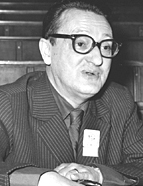

Luis Guilherme Furtado Mendonça Castilho de Albuquerque (who often used the shortened form Luís Guilherme Mendonça de Albuquerque) was born in Lisbon on 6 March, 1917, the firstborn son of Eduardo Castilho de Albuquerque, an Army officer of the Cavalry, and Emília Sá Mendonça Furtado de Albuquerque. His paternal grandparents were Luís de Albuquerque and Virgínia Júlia de Castilho de Albuquerque. In 1943, he married Maria Benedita Lares de Morais. In Coimbra, he attended the two high schools Liceu José Falcão and Liceu Júlio Henriques and later entered the Colégio Militar [Military College] (student number 89) and completed the general high school course in 1934. He studied Mathematics at the Faculdade de Ciências da Universidade de Coimbra [Faculty of Science of the University of Coimbra], finishing his degree at the Faculdade de Ciências da Universidade de Lisboa [Faculty of Science of the University of Lisbon] in 1939, and then in 1940 his degree in Geographical Engineering.
He began his university career in 1941 as an assistant of the 1st group (Analysis and Geometry) at the Faculdade de Ciências da Universidade de Coimbra, where he was chair of many subjects in Geometry, Algebra, Calculus and Design. In 1946, he was elected President of the Associação Académica de Coimbra [Academic Association of Coimbra] but was not allowed to take office officially for political reasons.
Two years later he was unanimously approved in the open tender for Professor of Design subjects and associated courses at the Faculdade de Ciências, and took up his post on 11 January, 1949. Ten years later, he obtained his doctorate in Mathematics with a final classification of 19 marks out of 20 at the University of Coimbra. He submitted the thesis Sobre a Teoria da Aproximação Funcional [On the Theory of Functional Approximation]. His PhD viva, which was essential to the full accomplishment of his academic career, was subject to various types of obstacles and delays for many years (his thesis had long been completed), as his political ideas were not in line with the official ideology of the regime. This situation was finally unblocked by the intervention of Manuel Lopes de Almeida, director of the Biblioteca Geral da Universidade de Coimbra [General Library of the University of Coimbra] at the time, and a senior figure in the regime (he became Minister of Education in 1961-2). He was a lifelong friend of Luís de Albuquerque and vouched for him before the political police. The adverse conditions created for him at the University involved a teaching timetable of over thirty hours per week.
